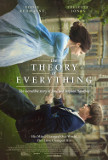Theory of Everything, The (United Kingdom, 2014)
November 12, 2014
James Marsh's The Theory of Everything is an unremarkable bio-pic about a remarkable man. Its ordinariness is in large part compensated for by an extraordinary performance from lead actor Eddy Redmayne. Those looking for a chronology of the life of Stephen Hawking from 1963 until around 2000 will find it here. Like Jobs, however, in attempting to cover so much time, it uses an episodic approach that skips over key moments and rushes through others. The Theory of Everything shows Hawking's brilliance, courage, and tenacity but, more often than not, it skims the surface.
At age 72, Hawking has defied the odds. Diagnosed 50 years ago with ALS (Lou Gehrig's Disease), Hawking has not only extended his original death sentence by 48 years but, despite losing the use of almost the entirety of his body, has challenged and changed fundamental scientific views about cosmology and time. The Theory of Everything gives us a sense of this, but the glimpse is fleeting. We are expected to take it on faith that Hawking is brilliant; explaining why that is the case would make this into a dry and potentially indecipherable motion picture. (Those with a real desire to learn more are advised to read Hawking's A Brief History of Time or watch the Errol Morris documentary loosely based on it.) The narrative presented in The Theory of Everything is based on the memoir of Hawking's first wife, Jane (played in the film by Felicity Jones), so it concentrates less on theoretical physics and more on the real-life difficulties encountered by the couple: difficulties that eventually ended their marriage.
We first encounter Hawking as a graduate student at Cambridge: a brilliant 22-year old uncertain of the field in which he wants to specialize. Hawking is gangly, awkward, and a little clumsy, but those things don't stop him from pursuing a relationship with an attractive liberal arts major by the name of Jane. As the two fall in love and Hawking's interests begin gravitating toward the study of black holes and the origins of the universe, he is dealt a devastating blow: he has ALS. His mind will remain unclouded but his control over his body will deteriorate. The doctors give him two years to live. Jane becomes his lifeline from the whirlpool of depression into which he sinks. The two marry and, over the next decade, have three children. Hawking becomes confined to a wheelchair and, after an emergency tracheotomy, loses his voice. Caring for Hawking and his children becomes too much for Jane. She seeks the aid of others, including the full-time nurse who will eventually become Hawking's second wife.
Eddy Redmayne's performance is attracting Oscar buzz and it's no wonder: this is the kind of astonishing physical transformation that the Academy often admires and acknowledges. (Think Daniel Day-Lewis in My Left Foot.) Not only does Redmayne look the part of Hawking but he provides viewers with a painful understanding of the slow degeneration of the physicist's motor skills. By the end of the film, Redmayne is acting with little more than his face and eyebrows yet, despite those limitations, he conveys not only emotion but an understanding of how feverishly Hawking's trapped brain continues to function. Felicity Jones, although working in Redmayne's shadow, provides an appealing Jane. In many ways, The Theory of Everything is more about her struggle than her husband's. In the beginning, she's convinced that their love will be enough and together they can win the battle. By the end, beaten down and bedraggled, she is forced to admit defeat.
Like most well-made bio-pics, The Theory of Everything takes us on a long, winding journey but the lack of conflict makes the film an occasionally dry experience. Everyone is presented as good and decent. (Perhaps this is one reason why Hawking so enthusiastically endorsed the production.) When Jane falls in love with her church choir director, their relationship remains platonic out of respect for Hawking. The Theory of Everything is about Jane's psychological and emotional struggles but the manner in which it rockets through the years mutes the intensity of those difficulties. Marsh (whose most notable previous endeavor was the documentary Man on Wire) has provided us with a jumping-off point for those who want to learn more about Hawking but this is by no means a definitive or innovative cinematic biography. The standout aspect of The Theory of Everything is undeniably Redmayne, whose unforgettable performance brings a new dimension to the man most of us know only from his wheelchair-bound, nearly locked-in appearances.
Theory of Everything, The (United Kingdom, 2014)
Cast: Eddy Redmayne, Felicity Jones, David Thewlis
Screenplay: Anthony McCarten, based on "Travelling to Infinity: My Life with Stephen" by Jane Hawking
Cinematography: Benoit Delhomme
Music: Johann Johannsson
U.S. Distributor: Focus Features
U.S. Release Date: 2014-11-07
MPAA Rating: "PG-13" (Profanity, Adult Themes)
Genre: DRAMA
Subtitles: none
Theatrical Aspect Ratio: 2.35:1
- (There are no more better movies of Eddy Redmayne)
- (There are no more worst movies of Eddy Redmayne)
Comments